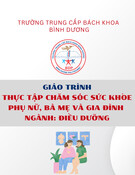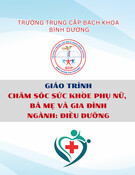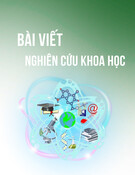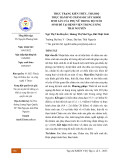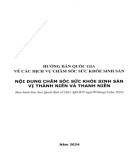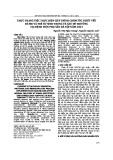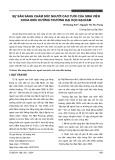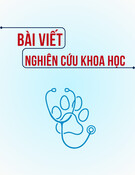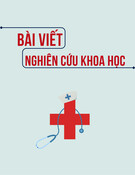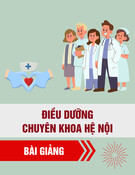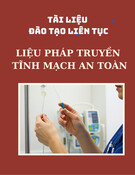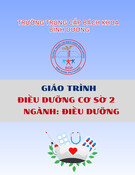
► CHUYÊN ĐỀ LAO ◄
81
KNOWLEDGE, ATTITUDES,
AND PRACTICES REGARDING REPRODUCTIVE HEALTH AMONG STUDENTS
AT DONG AN HIGH-TECH COLLEGE AND RELATED FACTORS
Nguyen Thuy Linh1, Mai Hoa2, Vi Mai Anh2*, Vu Ngoc Anh3,
Huynh Tan Dat3, Dinh Thi Thuy Dung3, Tran Phan My Duyen3, Phan Chuyen Nhi3
1University of Health Sciences, Vietnam National University at Ho Chi Minh City - Hai Thuong Lan Ong Street,
Ho Chi Minh City National University Urban Area, Dong Hoa Ward, Di An City, Binh Duong Province, Vietnam
2Thu Duc City Hospital - 29 Phu Chau, Tam Phu Ward, Thu Duc City, Ho Chi Minh City, Vietnam
3Dong An High Technology College - 90 30/4 Street, Binh An Ward, Di An City, Binh Duong Province, Vietnam
Received: 23/03/2025
Revised: 04/04/2025; Accepted: 23/04/2025
ABSTRACT
Objective: This study aims to assess the knowledge, attitudes, and practices (KAP) regarding
reproductive health among students at Dong An High-Tech College in 2024 and explore
associated factors.
Methods: A cross-sectional study was conducted at Dong An High-Tech College from September
to December 2024. The study included 430 full-time students from the 2021 cohort of the
bridging program, selected using a convenience sampling method. Data were collected through
a structured questionnaire comprising four sections: demographic information, knowledge,
attitudes, and practices regarding reproductive health. The measurement scales were adapted
from previous studies and adjusted for the study context.
Results: Among the 430 surveyed students, 42.09% correctly understood the concept of
reproductive health, while 29.07% had a comprehensive grasp of key aspects of reproductive
health care. Additionally, 53.02% demonstrated accurate knowledge of contraceptive methods,
whereas only 17.44% had a clear understanding of sexually transmitted infections (STIs).
Attitudes toward reproductive health were generally positive, with 66.51% of students
considering reproductive health highly important. However, varying opinions were observed
regarding premarital sex and abortion. Pearson correlation analysis revealed a moderate
positive relationship between knowledge and attitudes (r = 0.416, p < 0.001), whereas the
correlation between attitudes and practices was weaker (r = 0.118, p = 0.014). These findings
highlight the need for enhanced reproductive health education programs to improve students'
awareness and adoption of appropriate health practices.
Conclusion: While students recognize the importance of reproductive health, their actual
knowledge remains limited, particularly regarding contraceptive methods and STIs. A clear
association was found between knowledge and attitudes, but attitudes had a limited impact on
behavior. Therefore, reproductive health education should be strengthened to enhance students’
understanding and encourage appropriate health behaviors.
Keywords: reproductive health, contraceptive methods, sexually transmitted infections.
*Corresponding author
Email: vianh.yds@gmail.com Phone: (+84) 387633990 Https://doi.org/10.52163/yhc.v66i3.2504
Vietnam Journal of Community Medicine, Vol. 66, No. 3, 81-87

www.tapchiyhcd.vn
82
KIẾN THỨC, THÁI ĐỘ, HÀNH VI VỀ CHĂM SÓC SỨC KHỎE SINH SẢN
CỦA SINH VIÊN TRƯỜNG CAO ĐẲNG CÔNG NGHỆ CAO ĐỒNG AN
VÀ CÁC YẾU TỐ LIÊN QUAN
Nguyễn Thùy Linh1, Mai Hóa2, Vi Mai Anh2*, Vũ Ngọc Ánh3,
Huỳnh Tấn Đạt3, Đinh Thị Thùy Dung3, Trần Phan Mỹ Duyên3, Phan Chuyên Nhi3
1Trường Đại học Khoa học Sức khỏe, Đại học Quốc gia Thành phố Hồ Chí Minh - Đường Hải Thượng Lãn Ông,
Khu đô thị Đại học Quốc gia Thành phố Hồ Chí Minh, P. Đông Hòa, Tp. Dĩ An, Tỉnh Bình Dương, Việt Nam
2Bệnh viện Thành phố Thủ Đức - 29 Phú Châu, P. Tam Phú, Tp. Thủ Đức, Tp. Hồ Chí Minh, Việt Nam
3Trường Cao đẳng công nghệ cao Đồng An - 90 Đường 30 Tháng 4, P. Bình An, Tp. Dĩ An, Tỉnh Bình Dương, Việt Nam
Ngày nhận bài: 23/03/2025
Chỉnh sửa ngày: 04/04/2025; Ngày duyệt đăng: 23/04/2025
TÓM TẮT
Mục tiêu: Khảo sát kiến thức, thái độ, hành vi chăm sóc sức khỏe sinh sản của sinh viên Trường
Cao đẳng Công nghệ cao Đồng An, năm 2024 và các yếu tố liên quan
Phương pháp: Nghiên cứu cắt ngang tại Trường Cao đẳng Công nghệ cao Đồng An từ tháng
9 đến tháng 12/2024, với 430 sinh viên khóa 2021 liên thông chính quy, chọn mẫu thuận tiện.
Dữ liệu thu thập qua bộ câu hỏi gồm: thông tin nhân khẩu học, kiến thức, thái độ và hành vi về
chăm sóc sức khỏe sinh sản (CSSKSS), dựa trên các nghiên cứu trước đó và điều chỉnh phù hợp.
Kết quả: 42,09% sinh viên hiểu đúng khái niệm CSSKSS, 29,07% nắm rõ nội dung chính,
53,02% có kiến thức đúng về tránh thai, chỉ 17,44% hiểu rõ về bệnh lây truyền qua đường tình
dục. 66,51% đánh giá CSSKSS rất quan trọng, nhưng vẫn còn quan điểm khác nhau về quan hệ
tình dục trước hôn nhân và nạo phá thai. Phân tích Pearson cho thấy mối liên hệ giữa kiến thức
và thái độ khá rõ (r = 0,416; p < 0,001), nhưng giữa thái độ và hành vi còn yếu (r = 0,118; p =
0,014).
Kết luận: Nghiên cứu cho thấy sinh viên có nhận thức tốt về tầm quan trọng của chăm sóc sức
khỏe sinh sản (CSSKSS) nhưng kiến thức thực tế vẫn còn hạn chế, đặc biệt về biện pháp tránh
thai và bệnh lây truyền qua đường tình dục. Mối liên hệ giữa kiến thức và thái độ khá rõ ràng,
nhưng thái độ chưa tác động mạnh đến hành vi. Do đó, cần tăng cường giáo dục CSSKSS để
nâng cao hiểu biết và thực hành đúng trong sinh viên.
Từ khóa: Sức khỏe sinh sản, biện pháp tránh thai, bệnh lây truyền qua đường tình dục.
1. ĐẶT VẤN ĐỀ
Sự phát triển của công nghệ giúp tiếp cận thông tin về
sức khỏe sinh sản dễ dàng hơn, nhưng cũng gia tăng
nguy cơ tiếp nhận thông tin sai lệch. Cùng với đó, các
vấn đề về chăm sóc sức khỏe sinh sản ngày càng trở nên
đáng lo ngại, đòi hỏi nâng cao nhận thức cộng đồng.
Chăm sóc sức khỏe sinh sản là vấn đề quan trọng tại
Việt Nam và thế giới [1], bao gồm phòng tránh thai,
phòng ngừa bệnh lây truyền qua đường tình dục, duy
trì vệ sinh cá nhân và tiếp cận dịch vụ y tế phù hợp [2].
Tuy nhiên, nhiều thanh niên chưa có kiến thức đầy đủ về
tình dục an toàn, dẫn đến tỷ lệ mang thai ngoài ý muốn
và mắc bệnh lây truyền qua đường tình dục ngày càng
cao [3,4]. Theo UNFPA (2022), Việt Nam thuộc nhóm
20 nước có tỷ lệ phá thai vị thành niên cao nhất thế giới,
với khoảng 300.000 ca/năm, trong đó 70% là học sinh,
sinh viên [5]. Sinh viên là nhóm đối tượng có nguy cơ
cao do sự thay đổi tâm sinh lý, quan niệm sống thoáng
hơn và dễ tiếp cận nhiều nguồn thông tin khác nhau [6].
Tuy nhiên, giáo dục về chăm sóc sức khỏe sinh sản chưa
được quan tâm đầy đủ, cả trong gia đình lẫn nhà trường
[7]. Trường Cao đẳng Công nghệ cao Đồng An chưa
có nghiên cứu nào đánh giá kiến thức, thái độ, hành vi
của sinh viên về chăm sóc sức khỏe sinh sản. Do đó,
nghiên cứu này được thực hiện nhằm trả lời câu hỏi:
“Kiến thức, thái độ, hành vi của sinh viên Trường Cao
đẳng Công nghệ cao Đồng An về chăm sóc sức khỏe
V.M. Anh et al. / Vietnam Journal of Community Medicine, Vol. 66, No. 3, 81-87
*Tác giả liên hệ
Email: vianh.yds@gmail.com Điện thoại: (+84) 387633990 Https://doi.org/10.52163/yhc.v66i3.2504

83
sinh sản như thế nào?”
Mục tiêu: Khảo sát kiến thức, thái độ và hành vi về
chăm sóc sức khỏe sinh sản của sinh viên Trường Cao
đẳng Công nghệ cao Đồng An, năm 2024.
2. ĐỐI TƯỢNG VÀ PHƯƠNG PHÁP NGHIÊN CỨU
2.1. Thiết kế nghiên cứu: Nghiên cứu cắt ngang.
2.2. Thời gian và địa điểm nghiên cứu: Nghiên cứu
được thực hiện tại Trường Cao đẳng Công nghệ cao
Đồng An từ tháng 9 năm 2024 đến tháng 12 năm 2024.
2.3. Đối tượng nghiên cứu: Sinh viên khóa 2021 cao
đẳng liên thông hệ chính quy đang theo học tại Trường
Cao đẳng Công nghệ cao Đồng An.
2.4. Cỡ mẫu và cách chọn mẫu: Cỡ mẫu điều tra được
thực hiện trên toàn bộ sinh viên năm nhất trung cấp hệ
chính quy tại Trường Cao Đẳng Công Nghệ Cao Đồng
An, cỡ mẫu được xác định dựa theo nguyên tắc mẫu
nghiên cứu cắt ngang mô tả phân tích với mức độ sai
số cho phép (d) = 0,05 với độ tin cậy thống kê đạt 95%
[8]. Cỡ mẫu tính theo công thức ước lượng một tỷ lệ n
= 384 sinh viên được tham gia khảo sát. Để dự phòng
trong quá trình khảo sát, chúng tôi dự trù thêm 10% so
với cỡ mẫu nên ta có n = 384 + 384 x 10% = 422.
Làm tròn n = 430 và chọn 430 sinh viên đủ tiêu chuẩn
chọn mẫu và không thuộc tiêu chuẩn loại trừ để khảo
sát.
2.5. Phương pháp thu thập số liệu: Nhóm nghiên cứu
xây dựng bộ câu hỏi khảo sát tự điền dựa trên tài liệu
liên quan và các nghiên cứu trước [8][9]. Trước khi
phát phiếu khảo sát, người tham gia được giải thích rõ
mục đích, ý nghĩa của nghiên cứu và hướng dẫn cách
trả lời. Bộ câu hỏi khảo sát được xây dựng dựa trên các
nghiên cứu trước đó và điều chỉnh để phù hợp với môi
trường khảo sát. Bộ câu hỏi gồm bốn phần: (a) Thông
tin chung về đối tượng nghiên cứu, gồm 10 câu hỏi liên
quan đến nhân khẩu học; (b) Kiến thức về chăm sóc sức
khỏe sinh sản, gồm 10 câu hỏi, được chấm điểm và phân
loại thành ba mức: tốt, trung bình, yếu; dựa trên nghiên
cứu của Nguyễn Ngọc Nghĩa và cộng sự năm 2024 [9]
(c) Thái độ về chăm sóc sức khỏe sinh sản, gồm 10
câu hỏi với tổng điểm 40, phân thành ba mức: tốt (40
điểm), trung bình (20 - <40 điểm), và kém (<20 điểm)
dựa trên nghiên cứu của Nguyễn Văn Tới và cộng sự
[8]; (d) Hành vi về chăm sóc sức khỏe sinh sản, gồm 10
câu hỏi với thang điểm có/không, phân loại thành đúng
(≥ 15 điểm) và chưa đúng (< 15 điểm) [8].
2.6. Biến số và chỉ số nghiên cứu:
Nghiên cứu sử dụng hai nhóm biến số chính: biến số
độc lập và biến số phụ thuộc.
Biến số độc lập: Gồm các đặc điểm nhân khẩu học của
đối tượng nghiên cứu, bao gồm giới tính, tuổi, dân tộc,
tôn giáo, khối ngành học, nơi ở hiện tại, và tình trạng
kinh tế gia đình. Các biến này chủ yếu là biến nhị phân
hoặc biến thứ tự.
Biến số phụ thuộc: Bao gồm kiến thức về chăm sóc sức
khỏe sinh sản: Được đánh giá qua các câu hỏi về khái
niệm, nội dung, mục đích, đối tượng cần chăm sóc sức
khỏe sinh sản, phương pháp tránh thai, thời điểm dễ
mang thai, cách phòng ngừa bệnh lây qua đường tình
dục... Dữ liệu thu thập dưới dạng biến thứ tự.
Thái độ về chăm sóc sức khỏe sinh sản: Đánh giá mức
độ quan trọng, mức độ đồng ý với các biện pháp an toàn,
sự sẵn sàng tiếp cận thông tin và dịch vụ, quan điểm về
quan hệ tình dục trước hôn nhân, nạo phá thai... Thang
đo sử dụng các mức độ từ thấp đến cao.
Hành vi chăm sóc sức khỏe sinh sản: Đánh giá dựa trên
các thói quen thực tế như vệ sinh cá nhân, theo dõi sức
khỏe, sử dụng biện pháp bảo vệ an toàn, tìm kiếm thông
tin từ nguồn đáng tin cậy... Dữ liệu được thu thập qua
câu trả lời có/không hoặc mức độ thực hiện.
2.7. Xử lý và phân tích số liệu: Sau khi thu thập, dữ
liệu được kiểm tra, mã hóa, xử lý và phân tích bằng
phần mềm SPSS và Microsoft Excel. Công tác kiểm
soát sai lệch được chú trọng ở cả khâu lựa chọn mẫu và
thu thập thông tin, nhằm đảm bảo tính chính xác và độ
tin cậy của kết quả. Tần số và tỷ lệ phần trăm được sử
dụng để mô tả kiến thức, thái độ và hành vi trong chăm
sóc sức khỏe sinh sản. Kiểm định Chi bình phương
được áp dụng để đánh giá mối liên quan giữa các biến
phân loại, trong khi hệ số tương quan Pearson đo lường
mức độ liên hệ tuyến tính giữa hai biến số liên tục.
2.8. Đạo đức nghiên cứu: Nghiên cứu đã được Hội
đồng Y Đức của Trường Cao Đẳng Công Nghệ Cao
Đồng An thông qua.
3. KẾT QUẢ
Biểu đồ 1. Kiến thức về chăm sóc
sức khỏe sinh sản của sinh viên (n =430)
Kết quả khảo sát trên 430 sinh viên cho thấy mức độ
hiểu biết về chăm sóc sức khỏe sinh sản còn nhiều hạn
V.M. Anh et al. / Vietnam Journal of Community Medicine, Vol. 66, No. 3, 81-87

www.tapchiyhcd.vn
84
chế. Chỉ 42,09% sinh viên (181 người) hiểu đúng khái
niệm sức khỏe sinh sản, trong khi tỷ lệ sinh viên nắm
rõ nội dung chính của chăm sóc sức khỏe sinh sản còn
thấp hơn, chỉ đạt 29,07% (128 người). Về mục đích của
chăm sóc sức khỏe sinh sản, 42,33% sinh viên (182
người) có nhận thức đúng. Tuy nhiên, 65,12% sinh viên
(280 người) nhận thức rằng chăm sóc sức khỏe sinh sản
là cần thiết cho tất cả mọi người.
Đối với kiến thức về phương pháp tránh thai hiệu quả
nhất, chỉ 53,02% sinh viên (228 người) có câu trả lời
đúng. Đặc biệt, chỉ 35,12% sinh viên (151 người) hiểu
đúng thời điểm có thể mang thai trong chu kỳ kinh
nguyệt, cho thấy tỷ lệ hiểu biết còn khá thấp. Về thuốc
tránh thai khẩn cấp, 58,84% sinh viên (253 người) hiểu
đúng thời điểm cần sử dụng, trong khi 41,16% (177
người) vẫn chưa nắm rõ.
Nhận thức về các bệnh lây truyền qua đường tình dục
còn nhiều hạn chế, khi chỉ 17,44% sinh viên (75 người)
biết rõ về các bệnh này, trong khi phần lớn (82,56% -
355 người) chưa có đủ kiến thức. Tuy nhiên, sinh viên
có hiểu biết về cách tốt nhất để ngăn ngừa viêm nhiễm
sau quan hệ tình dục chiếm tỷ lệ cao (79,77% - 343
người). Ngoài ra, 58,14% sinh viên (250 người) biết
cách nâng cao kiến thức về chăm sóc sức khỏe sinh sản
của bản thân, trong khi 41,86% (180 người) vẫn chưa
có phương pháp rõ ràng.
Biểu đồ 2. Thái độ của sinh viên
về chăm sóc sức khỏe sinh sản (n = 430)
Kết quả khảo sát cho thấy sinh viên có thái độ khá tích
cực đối với chăm sóc sức khỏe sinh sản, tuy nhiên vẫn
còn nhiều quan điểm khác nhau. Có 66,51% sinh viên
cho rằng chăm sóc sức khỏe sinh sản là rất quan trọng,
trong khi 4,65% đánh giá là ít quan trọng. Về việc sử
dụng biện pháp an toàn trong quan hệ tình dục, 48,60%
sinh viên hoàn toàn đồng ý, nhưng vẫn có 6,98% không
đồng ý. Khả năng tiếp cận các dịch vụ chăm sóc sức
khỏe sinh sản được đánh giá dễ dàng hoặc rất dễ dàng
bởi 47,21% sinh viên, trong khi 7,91% cảm thấy rất
khó khăn. Khi trao đổi với bác sĩ hoặc nhân viên y tế
về sức khỏe sinh sản, 52,33% sinh viên cảm thấy thoải
mái, nhưng 11,16% lại rất không thoải mái. Đáng chú
ý, 67,67% sinh viên cho rằng phòng tránh các bệnh lây
truyền qua đường tình dục là rất quan trọng, trong khi
6,28% đánh giá là ít quan trọng. Về mức độ sẵn sàng
chia sẻ thông tin với bạn bè hoặc người thân, 38,37%
sinh viên cảm thấy hơi ngại, trong khi 12,56% rất sẵn
sàng. Bên cạnh đó, 41,63% sinh viên đồng ý rằng tránh
thai là trách nhiệm cá nhân, nhưng 8,37% lại không
đồng ý. Đối với quan hệ tình dục khi còn đi học, 39,30%
sinh viên không thể chấp nhận, trong khi 16,51% xem
đó là điều bình thường. Quan điểm về việc có thai trước
hôn nhân cũng có sự phân hóa, với 35,12% sinh viên
xem là bình thường, nhưng 17,44% không thể chấp
nhận. Đặc biệt, phần lớn sinh viên (63,02%) không chấp
nhận việc nạo phá thai, trong khi 11,16% lại không quan
tâm đến vấn đề này.
Biểu đồ 3. Hành vi chăm sóc sức khỏe sinh sản
của sinh viên (n = 430)
Về hành vi, 49,77% từng bỏ qua dấu hiệu bất thường
của cơ thể do ngại chia sẻ, cho thấy vẫn còn tâm lý e
ngại khi đối mặt với các vấn đề sức khỏe.
Trong khi đó, 79,77% cho biết họ vệ sinh vùng kín đúng
cách, cho thấy ý thức tốt trong việc phòng ngừa bệnh
viêm nhiễm. Ngoài ra, 72,09% duy trì chế độ ăn uống
lành mạnh, giúp hỗ trợ quá trình dậy thì và phát triển
cơ thể.
Về thói quen tự kiểm tra sức khỏe, 72,33% theo dõi
chu kỳ kinh nguyệt hoặc sự phát triển cơ thể, trong khi
27,67% chưa thực hiện điều này. Tuy nhiên, 74,65%
tìm kiếm thông tin từ nguồn tin cậy như sách giáo khoa,
trang web uy tín hoặc bác sĩ, cho thấy họ có ý thức tìm
hiểu kiến thức chính xác.
Đối với việc điều trị các vấn đề CSSKSS, chỉ 36,98%
từng điều trị, trong khi 63,02% chưa từng điều trị, điều
này có thể do họ chưa từng gặp vấn đề hoặc chưa ý thức
đầy đủ về nhu cầu thăm khám.
Về biện pháp phòng tránh bệnh lây qua đường tình dục,
69,77% sử dụng biện pháp bảo vệ an toàn, nhưng vẫn
còn 30,23% chưa thực hiện, tạo ra nguy cơ lây nhiễm
cao. Đáng chú ý, 62,33% đã từng hỏi ý kiến cha mẹ
hoặc người lớn khi gặp thắc mắc về cơ thể, cho thấy có
sự hỗ trợ từ gia đình.
V.M. Anh et al. / Vietnam Journal of Community Medicine, Vol. 66, No. 3, 81-87

85
Ngoài ra, 76,98% thực hiện biện pháp bảo vệ sức khỏe
sinh sản, nhưng vẫn còn 23,02% chưa chú trọng đến
điều này. Cuối cùng, 81,86% tìm hiểu về rủi ro sức khỏe
sinh sản trước khi quan hệ tình dục, cho thấy sự chủ
động trong việc trang bị kiến thức.
Bảng 1. Kiến thức chăm sóc sức khỏe sinh sản
ở sinh viên và các mối liên quan (n = 430)
Biến số
Kiến thức
p-value
Đúng
(n,%)
Chưa
đúng
(n,%)
Giới
tính
Nam 37
(16,1%)
193
(83,9%)
< 0,001
Nữ 62
(31,0%)
138
(69,0%)
Ngành
học
Khác 70
(20,5%)
271
(79,5%)
0,016
Khối sức
khỏe 29
(32,6%)
60
(67,4%)
Thái
độ
Chưa đạt 0 (0%) 27
(100%)
0,003
Đạt 99
(24,6%)
304
(75,4%)
*Chi bình phương
Kết quả phân tích cho thấy có sự khác biệt có ý nghĩa
thống kê giữa kiến thức về chăm sóc sức khỏe sinh sản
- sinh dục (CSSKSS) với giới tính, ngành học và thái
độ của đối tượng nghiên cứu.
• Giới tính: Nữ có tỷ lệ trả lời đúng về kiến thức
CSSKSS cao hơn nam giới (31,0% so với 16,1%, p <
0,001). Điều này cho thấy nữ giới có thể quan tâm hơn
hoặc có cơ hội tiếp cận thông tin về CSSKSS nhiều hơn
so với nam giới.
• Ngành học: Sinh viên thuộc khối ngành sức khỏe có tỷ
lệ trả lời đúng cao hơn so với sinh viên các ngành khác
(32,6% so với 20,5%, p = 0,016). Điều này có thể phản
ánh chương trình đào tạo của khối ngành sức khỏe có
nội dung liên quan đến CSSKSS nhiều hơn.
• Thái độ: Những người có thái độ đạt về CSSKSS có tỷ
lệ trả lời đúng cao hơn so với nhóm có thái độ chưa đạt
(24,6% so với 0%, p = 0,003). Kết quả này nhấn mạnh
mối quan hệ giữa thái độ tích cực và mức độ hiểu biết
về CSSKSS.
Như vậy, giới tính, ngành học và thái độ đều có ảnh
hưởng đáng kể đến mức độ kiến thức về CSSKSS của
đối tượng nghiên cứu.
Bảng 2. Mối liên quan giữa giới tính và thái độ
chăm sóc sức khỏe sinh sản ở sinh viên (n = 430)
Giới tính
Thái độ
p-value
Đạt (n,%) Chưa đạt
(n,%)
Nam 210
(91,3%) 20 (8,7%)
0,027
Nữ 193
(96,5%) 7 (3,5%)
*Chi bình phương
Phân tích kiểm định Chi bình phương (χ²) cho thấy có
sự khác biệt có ý nghĩa thống kê giữa giới tính và thái
độ chăm sóc sức khỏe sinh sản (p = 0.027). Cụ thể, tỷ
lệ nam giới có thái độ đạt yêu cầu là 91.3%, trong khi
ở nữ giới là 96.5%. Ngược lại, tỷ lệ nam giới có thái độ
chưa đạt (8.7%) cao hơn so với nữ giới (3.5%). Với giá
trị p < 0.05, kết quả này cho thấy có mối liên quan đáng
kể giữa giới tính và thái độ chăm sóc sức khỏe sinh sản,
nghĩa là nữ giới có xu hướng có thái độ tích cực hơn so
với nam giới
Bảng 3. Tương quan giữa điểm thái độ, điểm kiến
thức và điểm hành vi chăm sóc sức khỏe sinh sản
của sinh viên (n =430)
Điểm thái
độ Điểm kiến
thức Điểm hành
vi
Điểm thái
độ - - 0,118*
(p < 0,014)
Điểm kiến
thức 0,416*
(p < 0.001) -
Điểm hành
vi - 0,891 -
*Tương quan Pearson
Kết quả phân tích tương quan Pearson cho thấy mối
tương quan dương trung bình giữa kiến thức và thái độ
chăm sóc sức khỏe sinh sản (r = 0.416, p < 0.001). Điều
này có nghĩa là khi mức độ kiến thức của cá nhân tăng,
thái độ của họ về chăm sóc sức khỏe sinh sản cũng có xu
hướng tích cực hơn. Mối quan hệ này có ý nghĩa thống
kê rất cao (p < 0.001), chứng tỏ rằng khả năng kết quả
này xảy ra do ngẫu nhiên là rất thấp.
Phân tích tương quan Pearson giữa điểm thái độ và điểm
hành vi cho thấy có mối tương quan dương rất yếu (r =
0.118, p = 0.014). Mặc dù hệ số tương quan thấp, giá trị
p < 0.05 cho thấy mối liên hệ này có ý nghĩa thống kê.
Điều này có nghĩa là khi điểm thái độ tăng, điểm hành
vi cũng có xu hướng tăng nhẹ. Tuy nhiên, mức độ tương
quan khá yếu, cho thấy thái độ có thể không phải là yếu
tố quyết định chính đối với hành vi.
Không có sự tương quan nào giữa điểm kiến thức và
điểm hành vi.
V.M. Anh et al. / Vietnam Journal of Community Medicine, Vol. 66, No. 3, 81-87

